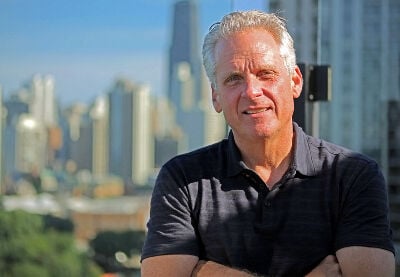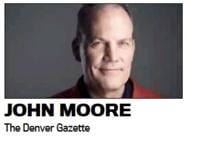How ‘Raganomics’ is shaking up the arts in Boulder and Golden | John Moore
TWFyayBSYWdhbiBpcyBrbm93biBmb3IgaGlzIC4uLiBlbnRodXNpYXN0aWMgLi4uIGN1cnRhaW4gc3BlZWNoZXMsIHRoaXMgb25lIHdlbGNvbWluZyBhdWRpZW5jZXMgdG8gYSBKdWx5IDIwMjMgcmVhZGluZyBvZiAiSG9wZSBhbmQgR3Jhdml0eSwiIGEgcGxheSB0aGF0IHdpbGwgbm93IGJlIGZ1bGx5IHN0YWdlZCBpbiBEZW52ZXIgYW5kIEJvdWxkZXIgaW4gZWFybHkgMjAyNS4=
Sk9ITiBNT09SRSwgVEhFIERFTlZFUiBHQVpFVFRF


Anyone who runs any arts organization anywhere is on the constant lookout for that elusive, big-time benefactor who can solve all your financial challenges with one fat check.
Almost never is that fat-checker one and the same person – both the administrator and the giver.
And in no universe would that benefactor also share the wealth with other neighboring (dare I say competing?) nonprofit arts organizations. It just never happens.
Mark Ragan of Black Hawk is that unicorn. No, that does not go far enough. He’s that rainbow-colored leprechaun with a unicorn horn and a pot of gold that he shares freely.
Ragan estimates he will give away about $1 million of his own money to local arts organizations this year alone.

Carolyn Holding and Christopher Joel Onken played the title characters in the Colorado Shakespeare Festival's 2016 production of Troilus and Cressida. This photo by Jennifer M. Koskinen greets 2024 festival attendees, including word in the upper right-hand corner that the season has an unexpected premier sponsor: A fellow Boulder troupe called the Boulder Ensemble Theatre Company.
Wendy Franz, Colorado Shakespeare Festival.

Carolyn Holding and Christopher Joel Onken played the title characters in the Colorado Shakespeare Festival’s 2016 production of Troilus and Cressida. This photo by Jennifer M. Koskinen greets 2024 festival attendees, including word in the upper right-hand corner that the season has an unexpected premier sponsor: A fellow Boulder troupe called the Boulder Ensemble Theatre Company.
In March 2023, Ragan stepped in to extend the life of the Boulder Ensemble Theatre Company, whose founders were winding down after 17 successful years. He’s now the company’s Managing Director – and its primary funder. He kicked in about $450,000 toward the company’s $1.2 million budget for his just-completed first season, and he’s targeted $300,000 for the next.
It’s hard to overstate how unusual that kind of arrangement is. Imagine part-owner Condoleezza Rice playing quarterback for the Denver Broncos.
But there’s more. Last month, the neighboring Colorado Shakespeare Festival began the most fraught two-year period of its 58-year existence – overdue renovations in and around the storied, 1,000-seat Mary Rippon Amphitheatre on the CU Boulder campus are forcing the festival to perform this summer and next in the ho-hum adjacent indoor theater. That means not only are audiences being temporarily denied the quintessential Colorado experience of Shakespeare under the Boulder stars – Producing Artistic Director Timothy Orr has only 30 percent of his usual ticket allotment available to sell. On top of that, a reliable season sponsor had to sit this season out.

Arts advocate and administrator Mark Ragan is an actor himself. Above, he is shown appearing in the Colorado Shakespeare Festival's "The Odyssey" in 2021.
JENNIFER M. KOSKINEN/COLORADO SHAKESPEARE FESTIVAL

Arts advocate and administrator Mark Ragan is an actor himself. Above, he is shown appearing in the Colorado Shakespeare Festival’s “The Odyssey” in 2021.
When Ragan called Orr to say he’d like his Boulder Ensemble Theatre Company to be the Colorado Shakespeare Festival’s 2024 premier season sponsor, “My first thought was, ‘He’s nuts,’” Orr said.
“And then immediately, I thought, ‘Oh, damn … that is so smart.’”
To Ragan, it was a no-brainer. This would be an act of philanthropy, sure. An example of community-building, no doubt. A nice thing to do, certainly. But it was also Marketing 101, Ragan said, given that BETC (colloquially known as “Betsy”) performs year-round – mostly just a stone’s throw away at Boulder’s Dairy Arts Center.
“The Shakespeare Festival probably has 30 or 40 times the patron database that we have,” Ragan said. “Those patrons are highly intelligent. Many of them come out of academia. Probably 90% of them are professionals. They love live theater. They are basically the exact same people we are looking for at BETC. Why would I not want to reach that audience, many of whom are now hearing about BETC’s existence for the first time?”

Arts advocate Mark Ragan made his fortune transforming his father's Ragan Communications into a $20 million a year business.
COURTESY RAGAN COMMUNICATIONS

Arts advocate Mark Ragan made his fortune transforming his father’s Ragan Communications into a $20 million a year business.
Ragan was willing to put up $25,000 of his own money to find out. Anyone arriving at the festival’s current summer productions of “Macbeth” or “The Merry Wives of Windsor” is greeted by monitors championing BETC’s role in funding the 2024 season. A recorded pre-show announcement that one Boulder theater company is the premier sponsor of another often draws an audible response from the audience perhaps best described as “appreciated surprise.”
And what does $25K mean to a company like Colorado Shakes, which has a $2 million 2024 operating budget? “It’s huge,” Orr said. Take your pick: Visiting artist housing for the season. A big chunk of artist payroll. “It elevates everything we do, if we spread it out correctly,” he said.
It helps, of course, when the giver and the receiver have a relationship that goes back for years. Ragan is clearly a successful businessman, no doubt made better by his own expansive performing background. Ragan has acted in the Shakespeare Festival’s “The Odyssey” (2021) and “The Winter’s Tale” (2023).
But Ragan’s generosity extends well beyond Colorado Shakes. When he moved to Colorado eight years ago, he fell in immediate love with the then-struggling Boulder Ballet. He’s a former board member, with an annual contribution nearing $80,000. The number keeps going up each year, he said, “because their other giving sources keep drying up.” In April, Ragan thought it would be a capital idea to invite the Joffrey Ballet’s Victoria Jaiani and Dylan Gutierrez to join the Boulder Ballet for a one-time performance of “After the Rain” by Christopher Wheeldon. And he made it happen.
Ragan has also given smaller amounts this year to Boulder’s Local Theater Company, The Catamounts, the Dairy Arts Center, Stories on Stage, the Boulder Philharmonic and Tara School for the Performing Arts. He has designated three BETC play readings as benefits for the Denver Actors Fund. And just Thursday, he expanded his reach into nearby Golden, committing $30,000 toward the new Miners Alley Playhouse season that opened this weekend with “School of Rock.”
“His excitement for theater, ballet and music runs so deep that he truly wants you to experience it, too,” said actor Jessica Robblee – also his BETC Artistic Director and creative partner.
“There’s such a pureness to his excitement and curiosity.”

From the Colorado Shakespeare Festival's "The Merry Wives of Windsor": Jessica Robblee, Ilana DeAngelo and Lavour Addison as the Page family.
JENNIFER M. KOSKINEN/COLORADO SHAKESPEARE FESTIVAL

From the Colorado Shakespeare Festival’s “The Merry Wives of Windsor”: Jessica Robblee, Ilana DeAngelo and Lavour Addison as the Page family.
Where did it start?
Ragan, now 67, is more than a mere theater aficionado. He is a theater practitioner, participant and big-time advocate who puts his money where his art – and heart – are. As his castmate in “The Odyssey,” Robblee said, “Mark would bring two coolers of food and drink for the cast every time we had a show.”
Dude just loves theater and theatermakers. How big of a theater geek is he? He and wife Jamie named all three of their daughters after Shakespeare characters – Cate, Olivia and Juliet. (Personally, I think they should have thrown in one Lear daughter, just to spice up the home life. I mean, c’mon: Regan Ragan?)
Ragan even credits theater with saving his life.
“I grew up on the south side of Chicago in a very dangerous neighborhood and fell into a very bad, tough gang,” he said. “The priest at my school took an active interest in separating me from that gang. He did that by telling me, ‘I want you to audition for this play.’
“I was 15 at the time and, man, I was in horrible shape. I was drinking and doing drugs, and my mother suffered from depression. I was living with my grandmother. But then I suddenly felt trapped in that wonderful cocoon that theater provides. I am telling you, it absolutely saved my life, there’s no doubt about it.”
Life has been much more fortuitous to Ragan since those hard early days.
In 1968, Ragan’s father Lawrence Ragan, a legend in the field from Ford Motor Company who has been called “the dean of organizational communicators,” launched a mom-and-pop shop called Ragan Communications. Meanwhile, Mark’s 15-year run as a political journalist included time as a White House correspondent for New York Newsday and other news services.
When Lawrence Ragan was diagnosed with ALS in 1993, he offered his son the family business, which Mark has grown into the largest of its kind in North America with a $20 million annual portfolio.
Ragan Communications essentially serves communications and P.R. professionals throughout their professional lives, from entry level through retirement. Or, as Ragan puts it, “from cradle to grave” through seminars, conferences and the like.
“This light bulb went off about seven years ago,” Ragan said. “We thought, ‘Oh my God, we’ve got a 99% penetration rate in the Fortune 1,000. Why don’t we launch a membership subscription?’ And it just shot through the roof. We charged $40,000 a year, and our renewal rate is 80%. We just started piling up cash. So as long as my company continues to do well, then I can continue to increase my contribution to the arts.”
How to be like Mark?
Ragan would be the first to admit his approach to both making and paying for art is not one that would be easily replicable by any other nonprofit arts organization. In Denver, the venerable Curious and Cherry Creek theater companies are among those who have found themselves in existential fights to financially survive.
It’s actually not great optics for a feisty little company like BETC, which pre-Ragan clawed its way forward behind consistently excellent theater and an equally effective business plan, to be seen as so flush that it can afford to invest $25,000 in a fellow nonprofit theater company as an expensive marketing strategy. This is a feel-good story that could backfire on Ragan if the local giving community were to conclude that BETC doesn’t need their support anymore because it has Ragan. It does.
That’s why Ragan, at the behest of the BETC board, has adopted a clarifying message about his unusual acts of giving. From now forward, Ragan is going to be careful to say that it’s not BETC itself that is donating money to all these other cultural organizations from its own revenues. It’s Ragan’s money, so his gifts are now going to be described as “from Mark Ragan on behalf of the Boulder Ensemble Theatre Company.”
“Everybody wants our donors to know that we’re not using their money to do this – and that makes sense,” Ragan said.
If only there were more Ragan unicorns out there. Theater fans who dearly love the craft, love the people and have healthy bank accounts. Maybe stories like Robblee’s would not be so uncommon. It’s the story of how these unlikely partners ultimately came to run BETC together.
The two were chatting (and, of course, snacking) backstage at “The Odyssey” when Ragan, to that point a stranger to Robblee, sought with his journalist’s curiosity to know Robblee’s story. She told him about her many creative efforts over the years to develop children’s theater programs in Denver. She garnered crowds and adoration from audience and critics. Not so much money.
“I was telling Mark how I’d elected to pause the long-running all-ages program I had been running at Buntport Theater,” she said. “I explained how much fundraising it really required, and how hard I had struggled with that part.”
Then Ragan said the six words that changed the direction of Robblee’s professional life: “Next time, just come to me.”
Robblee was stopped in her tracks.
“I thought, ‘Wait. Did I just meet someone who wants to support theater – and he just said so to my face as I ate licorice?” she said.
He did, and now the two run a $1.2 million theater company together. Talk about a unicorn.
John Moore is The Denver Gazette’s senior arts journalist. Email him at john.moore@gazette.com









